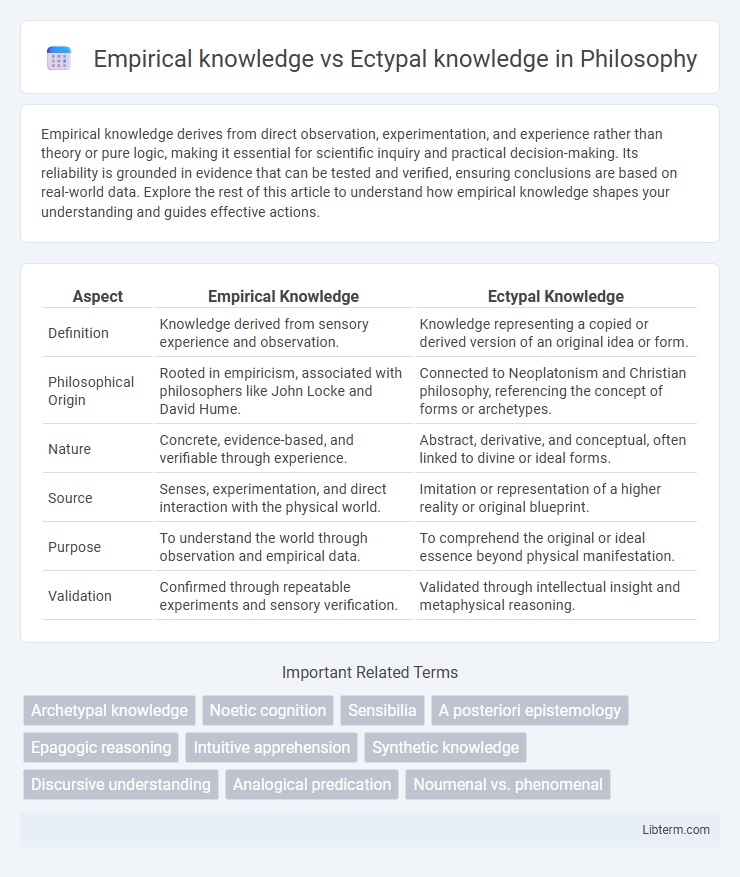Empirical knowledge derives from direct observation, experimentation, and experience rather than theory or pure logic, making it essential for scientific inquiry and practical decision-making. Its reliability is grounded in evidence that can be tested and verified, ensuring conclusions are based on real-world data. Explore the rest of this article to understand how empirical knowledge shapes your understanding and guides effective actions.
Table of Comparison
| Aspect | Empirical Knowledge | Ectypal Knowledge |
|---|---|---|
| Definition | Knowledge derived from sensory experience and observation. | Knowledge representing a copied or derived version of an original idea or form. |
| Philosophical Origin | Rooted in empiricism, associated with philosophers like John Locke and David Hume. | Connected to Neoplatonism and Christian philosophy, referencing the concept of forms or archetypes. |
| Nature | Concrete, evidence-based, and verifiable through experience. | Abstract, derivative, and conceptual, often linked to divine or ideal forms. |
| Source | Senses, experimentation, and direct interaction with the physical world. | Imitation or representation of a higher reality or original blueprint. |
| Purpose | To understand the world through observation and empirical data. | To comprehend the original or ideal essence beyond physical manifestation. |
| Validation | Confirmed through repeatable experiments and sensory verification. | Validated through intellectual insight and metaphysical reasoning. |
Introduction to Empirical and Ectypal Knowledge
Empirical knowledge is derived from sensory experience and observation, forming the foundation of scientific inquiry through measurable and testable data. Ectypal knowledge, rooted in Platonic philosophy, refers to knowledge as a derived or imperfect copy of a higher, ideal form of understanding that transcends sensory experience. Distinguishing these types highlights the contrast between knowledge grounded in direct experience and knowledge conceptualized as an abstract, ideal model.
Defining Empirical Knowledge
Empirical knowledge is defined as information acquired through direct observation, experimentation, and sensory experience, forming the basis of scientific inquiry and practical understanding. It contrasts with ectypal knowledge, which represents derived or imperfect copies of original ideas or forms. Empirical knowledge is foundational for evidence-based decision-making and hypothesis testing in various disciplines.
Understanding Ectypal Knowledge
Ectypal knowledge refers to representations of reality that are copies or interpretations derived from an original archetype, emphasizing mediated understanding rather than direct experience. Unlike empirical knowledge, which relies on sensory data and experimentation, ectypal knowledge depends on conceptual frameworks and symbolic models shaped by prior cognition. This form of knowledge is essential in complex fields like theology and philosophy, where direct empirical verification is limited or impossible.
Historical Perspectives on Knowledge Types
Empirical knowledge, rooted in sensory experience and observation, has historically been prioritized in scientific inquiry since the Renaissance, promoting evidence-based understanding of the natural world. Ectypal knowledge, derived from divine or ideal forms and often associated with Platonic philosophy, reflects a more metaphysical approach that influenced medieval scholasticism and theological frameworks. The historical tension between empirical and ectypal knowledge highlights the evolving methodologies of epistemology, balancing material evidence with transcendent truths across different intellectual eras.
Key Differences Between Empirical and Ectypal Knowledge
Empirical knowledge is derived from direct sensory experience and observation, relying on evidence gathered through experimentation and practical interaction with the physical world. Ectypal knowledge, in contrast, refers to representations or copies of original ideas, often mediated through symbols or abstractions rather than firsthand experience. The key difference lies in empirical knowledge being experiential and data-driven, whereas ectypal knowledge is conceptual and interpretative, emphasizing the form or idea over immediate reality.
The Role of Experience in Empirical Knowledge
Empirical knowledge is grounded in direct observation and sensory experience, which serves as the primary source of validation and understanding. Experience shapes empirical knowledge by continuously testing hypotheses and refining concepts through interaction with the physical world. This iterative process ensures empirical knowledge remains dynamic, evidence-based, and closely aligned with reality.
Revelation and the Formation of Ectypal Knowledge
Ectypal knowledge derives from divine revelation and presents a mediated, finite understanding of absolute truth, contrasting with empirical knowledge, which is based on sensory experience and observation. The formation of ectypal knowledge occurs through interpretative processes influenced by theological frameworks that shape human cognition toward grasping transcendent realities. This type of knowledge emphasizes the reception of truth as revealed by a higher authority rather than through empirical evidence or scientific methods.
Applications of Empirical vs Ectypal Knowledge
Empirical knowledge, grounded in observation and experimentation, drives advancements in scientific research, medical diagnostics, and engineering design by providing practical, evidence-based solutions. Ectypal knowledge, derived from idealized models or archetypes, plays a crucial role in philosophical reasoning, theoretical frameworks, and creative arts by offering abstract templates that guide conceptual understanding. Applications of empirical knowledge prioritize measurable outcomes and real-world validation, whereas ectypal knowledge supports innovation through ideal forms and symbolic interpretation.
Challenges in Distinguishing Knowledge Forms
Distinguishing empirical knowledge, derived from direct observation and experience, from ectypal knowledge, which is based on external representations or images of reality, presents significant challenges due to their overlapping content and reliance on interpretation. Empirical knowledge's foundation in sensory data may be confounded by cognitive biases, while ectypal knowledge depends heavily on accurate modeling and symbolic representation, which can introduce errors or misrepresentations. This ontological ambiguity complicates epistemological frameworks, making it difficult to validate the authenticity and applicability of knowledge claims in fields like philosophy, cognitive science, and artificial intelligence.
Implications for Philosophy and Theology
Empirical knowledge, derived from sensory experience and observation, grounds philosophy and theology in verifiable reality, promoting critical inquiry and evidence-based understanding of existence. Ectypal knowledge, reflecting divine or ideal forms as imperfect copies of ultimate truths, shapes metaphysical frameworks and theological doctrines by emphasizing transcendent origins and limitations of human cognition. The interplay between empirical data and ectypal concepts challenges philosophers and theologians to reconcile finite perception with infinite realities, influencing debates on epistemology, ontology, and the nature of divine revelation.
Empirical knowledge Infographic

 libterm.com
libterm.com